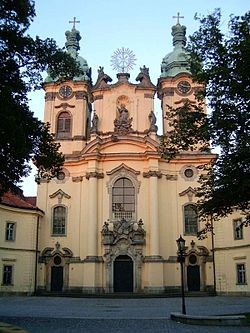Legnickie Pole
| Legnickie Pole | |||
|---|---|---|---|
| Village | |||

St. Hedwig's church
|
|||
|
|||
| Coordinates: 51°09′N 16°15′E / 51.150°N 16.250°E | |||
| Country |
|
||
| Voivodeship | Lower Silesian | ||
| County | Legnica County | ||
| Gmina | Legnickie Pole | ||
| Population | 780 | ||
Legnickie Pole [lɛɡˈnit͡skʲɛ ˈpɔlɛ] (in 1945-1948 Dobre Pole, German: Wahlstatt) is a village in Legnica County, Lower Silesian Voivodeship, in south-western Poland. It is the seat of the administrative district (gmina) called Gmina Legnickie Pole.
It lies approximately 10 kilometres (6 mi) southeast of Legnica, and 56 kilometres (35 mi) west of the regional capital Wrocław. The village has a population of 780.
The village was the site of the decisive Battle of Legnica (Battle of Liegnitz) on 9 April 1241. In the battle, Mongols of the Golden Horde led by Kadan and Baidar defeated a Polish-German army under Duke Henry II the Pious of Silesia. The Mongols annihilated their opponents and joined with the main army in Hungary, but upon receiving the news of the death of their Grand Khan Ögedei Khan, they turned back to attend to the election of a new Khagan, or Grand Khan. The battle marked the westernmost expansion of the Mongols into central Europe. From 1335 until 1742 it was part of the Kingdom of Bohemia and thus later of Austria.
The village became part of the Kingdom of Prussia during the 18th century Silesian Wars in 1742. During the Napoleonic Wars, the Prussian general Prince Blücher defeated a French army under Marshal MacDonald at the Katzbach, a small river running through Wahlstatt and Liegnitz, in the Battle of Katzbach on 26 August 1813. In honor of this victory Blücher received the title Prince of Wahlstatt on 3 June 1814.
...
Wikipedia



